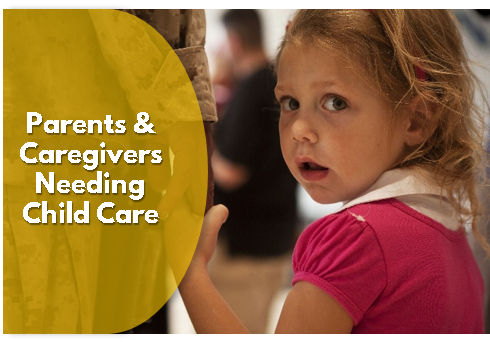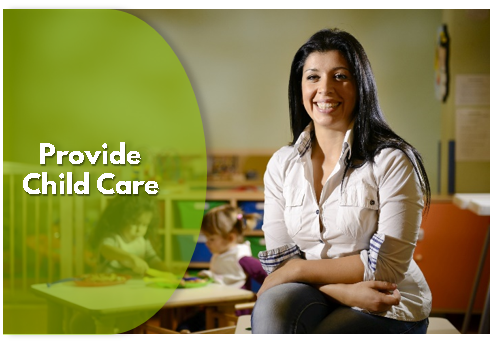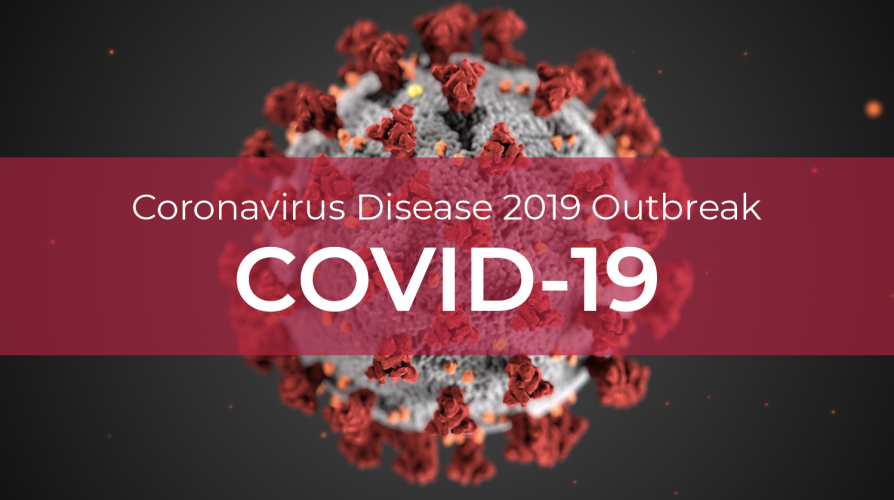
Information about Child Care for Families, Child Care Providers, Early Childhood Grants, Programming, and Initiatives on Coronavirus Disease 2019 (COVID-19).
We understand staff, parents, and children may have questions and concerns about COVID-19. The MSDE will remain vigilant in providing all information regarding the virus as it pertains to the health and safety of students and staff in child care programs.
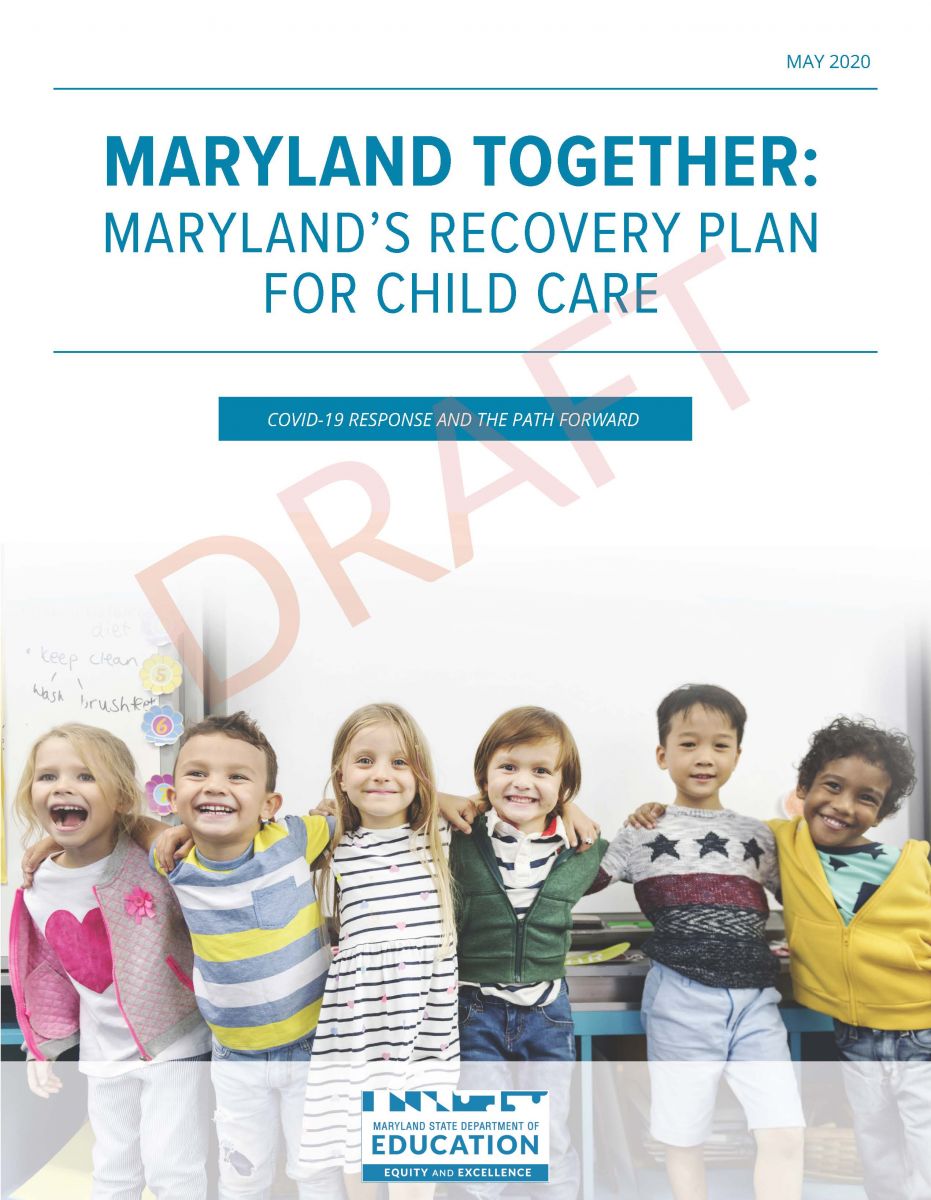 Maryland Together: Maryland’s Recovery Plan for Child Care Outlines Path Forward for Child Care During COVID-19 Pandemic
Maryland Together: Maryland’s Recovery Plan for Child Care Outlines Path Forward for Child Care During COVID-19 Pandemic
The Maryland State Department of Education (MSDE) developed Maryland Together: Maryland’s Recovery Plan for Child Care, a plan to continue and expand child care during the COVID-19 Pandemic. As the State entered the first recovery stage, MSDE announced the immediate start of a transition phase for child care, expanding access to child care to include families returning to work under Governor Hogan’s latest Executive Order. MSDE established a comprehensive stakeholder task force, including family and center-based providers, child care advocates, as well as Maryland Department of Health representatives, to provide recommendations that helped to inform the recovery plan.
View the full Recovery Plan and the Plan FAQs for Parents and Providers.
 Memoriam Page
Memoriam Page
New page launched by the Division of Early Childhood to pay homage to early childhood community members who have passed away due to COVID-19.
To submit a memoriam announcement email: earlychildhood.msde@maryland.gov with Memoriam in the subject line.
FDA Updates on Hand Sanitizers with Methanol (7/22/2020)
FDA is warning consumers and health care providers that the agency has seen a sharp increase in hand sanitizer products that are labeled to contain ethanol (also known as ethyl alcohol) but that have tested positive for methanol contamination. Methanol, or wood alcohol, is a substance that can be toxic when absorbed through the skin or ingested and can be life-threatening when ingested.
The agency is aware of adults and children ingesting hand sanitizer products contaminated with methanol that has led to recent adverse events including blindness, hospitalizations and death.
Methanol is not an acceptable active ingredient for hand sanitizers and must not be used due to its toxic effects. FDA’s investigation of methanol in certain hand sanitizers is ongoing. The agency will provide additional information as it becomes available.
Consumers who have been exposed to hand sanitizer containing methanol and are experiencing symptoms should seek immediate treatment for potential reversal of toxic effects of methanol poisoning. Substantial methanol exposure can result in nausea, vomiting, headache, blurred vision, permanent blindness, seizures, coma, permanent damage to the nervous system or death. Although all persons using these products on their hands are at risk for methanol poisoning, young children who accidently ingest these products and adolescents and adults who drink these products as an alcohol (ethanol) substitute, are most at risk.
FDA reminds consumers to wash their hands often with soap and water for at least 20 seconds, especially after going to the bathroom; before eating; and after coughing, sneezing, or blowing one’s nose. If soap and water are not readily available, the Centers for Disease Control and Prevention (CDC) recommend consumers use an alcohol-based hand sanitizer that contains at least 60 percent ethanol (also referred to as ethyl alcohol).
FDA remains vigilant and will continue to take action when quality issues arise with hand sanitizers. The agency is especially concerned with:
- The dangers of drinking any hand sanitizer under any conditions. While hand sanitizers with possible methanol contamination are more life-threatening than those that are not contaminated, FDA urges consumers not to drink any of these products.
- Certain hand sanitizers that may not contain a sufficient amount of ethyl alcohol or isopropyl alcohol.
- Hand sanitizers that are sold or offered for sale with false and misleading, unproven claims that they can prevent the spread of viruses such as COVID-19, including claims that they can provide prolonged protection (e.g., for up to 24-hours).
- Products that are fraudulently marketed as “FDA-approved” since there are no hand sanitizers approved by FDA.
- Products packaged to appear as drinks, candy or liquor bottles, as well as products marketed as drinks or cocktails because their appearance could result in accidental ingestion or encourage ingestion. Children are particularly at risk with these products since ingesting only a small amount of hand sanitizer may be lethal in a young child.
Methanol Contaminated Product List
RESOURCES
Classroom Resources for Teachers, Parents, and Kids at Home
Learning Language Every Day: Activities for Families/Aprendiendo lenguaje todos los días: Actividades para familias
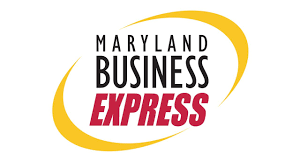 Coronavirus (COVID-19) Information for Businesses
Coronavirus (COVID-19) Information for Businesses
Visit the Maryland Business Express for information on managing your business during the Coronavirus outbreak and aid opportunities. Topics include:
- Employer & Worker Assistance
- Financial Assistance & Taxes
- Licensing & Permitting
- Enforcement


